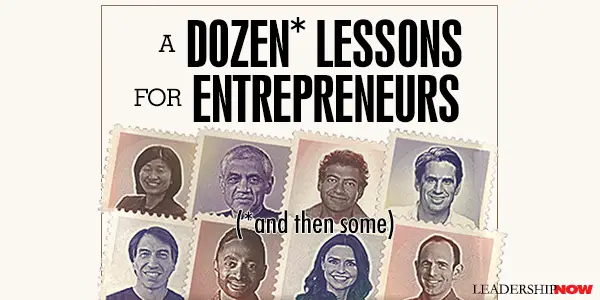 |
 |
01.26.18

A Dozen Lessons for Entrepreneurs
T For A Dozen Lessons for Entrepreneurs, Griffin has interviewed 35 people who have “seen more highly successful business launched than any other single group on the planet.” He offers 12 quotes from each followed by short explanations to provide clarity and context. The book is a real education that is worth taking the time to reflect on and absorb. You will get an experiential education from investors like Steve Blank, Marc Andreessen, Mary Meeker, Paul Graham, John Doerr, and Ben Horowitz. What follows are some of the thoughts that resonated with me: Eric Ries: “The mistake isn’t releasing something bad. The mistake is to launch it and get PR people involved. You don’t want people to start amping up expectations for an early version of your product. The best entrepreneurship happens in low-stakes environments where no one is paying attention, like Mark Zuckerberg’s dorm room at Harvard.” (p. 36) Sam Altman: “In general, it’s best if you’re building something that you need. You’ll understand it better than if you have to understand it by talking to a customer. Passion and a mission are more likely to exist if a business is providing solutions to problems that cause the founders personal pain. In other words, a deep understanding of a valuable customer problem and potential solutions to that problem is enhanced if the founders are themselves potential customers for the solution.” (p. 44) Sam Altman: “Eliminate distractions. The hard part of running a business is that there are a hundred things that you could be doing, and only five of those matter, and only one of them matters more than all of the rest of them combined.” (p. 48) Steve Anderson: “Ten years ago, you needed $5 million to start a business. Today, you need $70 and some coding skills.” (p. 53) Rich Barton: “It’s much more powerful long-term to make up a new word than it is to use a literal word. I also like to high-point Scrabble letters in my brands if I can work them in. They are high point because they are rarely used. A letter that’s is rarely used is very memorable. Z and Q are all worth ten points in Scrabble. X is 8. They jump off the page when you read them, and they stick in your memory as interesting.” (p. 73) Chris Dixon: “You’ve either started a company or you haven’t. “Started” means starting with no money, no help, no one who believes in you (except perhaps your closest friends and family), and building an organization from a borrowed cubicle with credit card debt and nowhere to seep except the office. It means lying awake at night worrying about running out of cash and having a constant know in your stomach during the day fearing you’ll disappoint the few people who believed in you and validate your smug doubters.” (p. 99) John Doerr: “Believe me; selling is honorable work—particularly in a startup, where it’s the difference between life and death.” (p. 102) Jim Goetz: Many of the entrepreneurs that we back are attacking a personal pain.” (p. 116) Paul Graham: “If you want to start a startup, you’re probably going to have to think of something fairly novel. A startup has to make something it can deliver to a large market, and ideas of that type are so valuable that all the obvious ones are taken. Usually, successful startups happen because the founders are sufficiently different from other people—ideas few others can see seem obvious to them.” (pp. 126-127) Reid Hoffman: “So many entrepreneurs are worried about protecting their precious ideas, but the truly valuable thing is that you’re in motion, you have momentum, and you are gathering all the necessary resources to make it happen.” (p. 158) Reid Hoffman: “The network of people around you I what extends your ability to be effective regarding expertise and reaching your goals. Put yourself out there and get feedback. Don’t be afraid to take a risk. Another huge thing to emphasize is the importance of your network. Get to know smart people. Talk to them. Stay current on what’s happening. People see things that other people don’t. If you try to analyze it all yourself, you miss things. Talk with people about what’s going on.” (pp. 160-161) Ben Horowitz: “Sometimes an organization doesn’t need a solution; it just needs clarity.” (p. 168) Vinod Khosla: “The single most important thing an entrepreneur needs to learn is whom to take advice from and on what topic. Ask different questions of different people, both those who have been successful and those who haven’t.” (p. 179) Keith Rabois: “As you get into the unchartered territory where you don’t actually have any intellectual background, you need perspectives from people who are very different from you. At that point, it’s actually quite valuable to have people who are diverse.” (p. 255) Keith Rabois: “First Principle: The team you build is the company you build.” (p. 254) Fred Wilson: “Reputation is the magnet that brings opportunities to you time and time again. I have found that being nice builds your reputation.” (p.302) 
Posted by Michael McKinney at 06:11 AM
|
BUILD YOUR KNOWLEDGE
 

How to Do Your Start-Up Right STRAIGHT TALK FOR START-UPS 
Grow Your Leadership Skills NEW AND UPCOMING LEADERSHIP BOOKS 
Leadership Minute BITE-SIZE CONCEPTS YOU CAN CHEW ON 
Classic Leadership Books BOOKS TO READ BEFORE YOU LEAD |